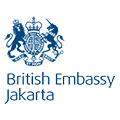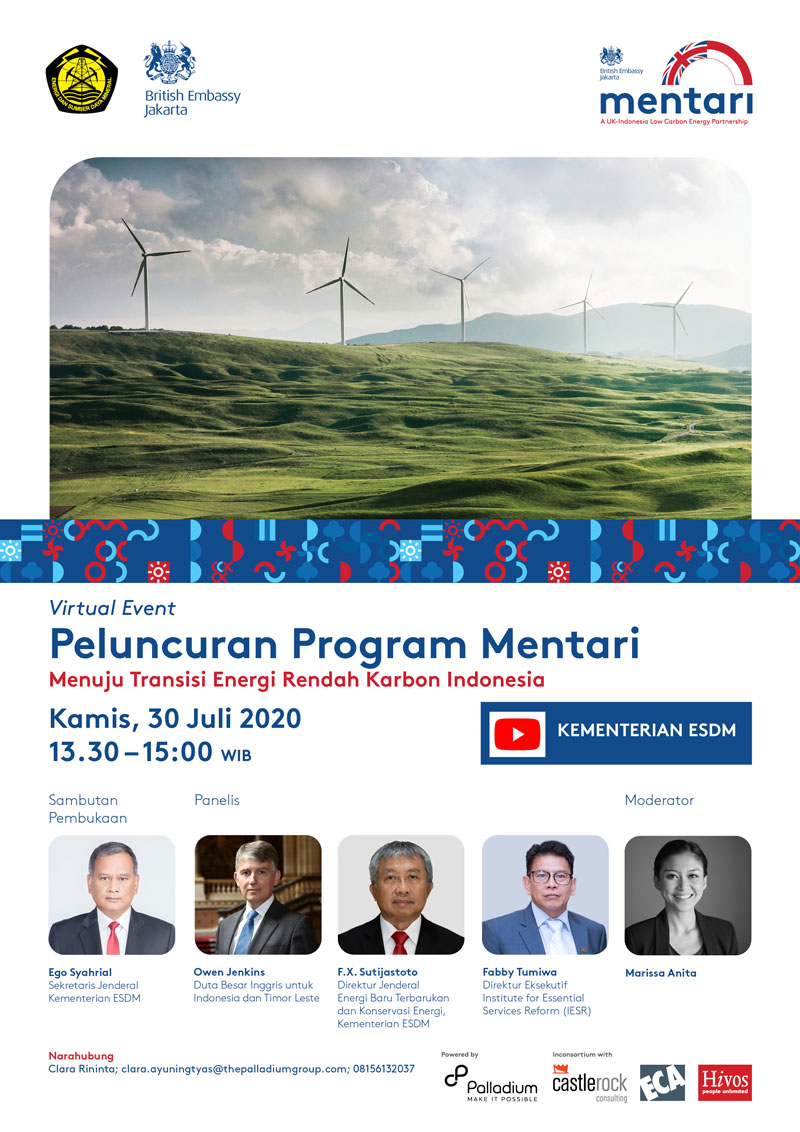In An Effort to Reach 23% of the Energy Mix, the British & Indonesian Government Form MENTARI
Jakarta, 30 July 2020 – The British and Indonesian governments, in this case the Ministry of Energy and Mineral Resources (Energi dan Sumber Daya Mineral/ESDM), cooperated in launching the program “Menuju Transisi Energi Rendah Karbon Indonesia” (Towards the Indonesian Low Carbon Energy Transition) or simply called MENTARI, Thursday (7/30/2020).
This virtual launch was opened directly by the Secretary General of the Ministry of Energy and Mineral Resources, Ego Syahrial. It is also attended by the Deputy Governor of East Nusa Tenggara, Josef Nae Soi and the British Ambassador to Indonesia and Timor Leste, Owen Jenkins. The MENTARI program was initiated as an effort to recover green economic activity in Indonesia, as well as the acceleration of the achievement of the energy mix of 23 percent in 2025. This is in line with the agreement of 40 state leaders regarding the recovery of Green Economy or “Build Back Better”, in the IEA energy transition summit, Wednesday (8/8/2020).
In his opening remarks, Ego Syahrial showed in-depth appreciation regarding the cooperation of the MENTARI program. According to Ego, this shows the concrete commitment of the British government in providing support and commitment to low-carbon transitions in Indonesia.
“Our fuel consumption is almost 80 percent lower than the same period last year. But the lock down policy due to the pandemic has a positive impact on the decline in significant carbon dioxide emissions in Indonesia. Therefore, during this difficult time, energy must be adjusted to create a new normal and improve the clean energy transition program. Indonesia has set a 23 percent target of renewable energy in an energy mix by 2025. This policy is combined with the commitment of Indonesia to reduce emissions by 29percent in 2030. It is a clear path to a cleaner energy system to achieve targets and encourage renewable energy investments,” explained Ego.
Ego explained again, the Indonesian government is currently preparing a Presidential Regulation on Feed in Tariff. The Indonesian government is also encouraging the use of renewable energy to provide energy supply for the Indonesian people in remote areas and replace all diesel power plants in the next three years. According to Ego, the MENTARI program initiative came on time to become part of the Indonesian net energy transition. Moreover, the program aims to realize the alleviation of inclusive economic development poverty by developing the energy sector in Indonesia, especially in eastern Indonesia. This program will support the increase in renewable energy in the countryside, through increasing energy in the involvement of the private sector, including international business in the renewable energy sector.
Meanwhile, the British Ambassador to Indonesia and Timor Leste, Owen Jenkins, reply to the sincere appreciation of the British government for Indonesia in accepting this joint program. Jenkins said that through this program, it can also provide economic growth and economic development and a secure and reliable energy access which is clearly fundamentals of any development.
“As said by the Secretary General in the opening speech, that in several regions such as Eastern Indonesia, where the availability of energy is very little, the effort to provide energy is fundamental to economic development there. We believe that the only reliable growth and long futures are clean and sustainable growth. The world needs to switch to cleaner energy,” Jenkins said.
The Director of Energy Conservation of the Directorate General of EBTKE, Haryanto also revealed the same thing. According to him Haryanto, one of the indicators of national energy access is the electrification ratio. The Indonesian Electrification Ratio in 2019 reached 98.89 percent and less than 100% because of the handling that was considered lacking in several regions and the eastern region. For example, in East Nusa Tenggara only reached 85 percent, 94 percent in Papua, 92 percent in Maluku and 94 percent in Southeast Sulawesi. This means, the MENTARI program is appropriate if focused on East Indonesia.
“The 100 percent target has been launched for 2020 and one of the focuses is, how to appreciate the use of renewable energy. We also have a target of 23 percent in 2025 to achieve a renewable energy mix in Indonesia. So, it’s right if it is focused on Eastern Indonesia. The use of renewable energy is also felt right because the potential of renewable energy in eastern Indonesia is very abundant,” Haryanto said.
Director of the Essential Institute of Essential Reform (IESR), Fabby Tumiwa added that the presence of the Mentari program was very appropriate, considering that Indonesia was experiencing a situation of the paradigm or the direction of development in the future. Will be continuing to develop with low carbon or high carbon.
“A number of studies stated that this is the right time if you want to enter the low carbon trajectory. One of them for Indonesia is the energy sector. From the study by Bappenas, Low Carbon Development Initiative last year showed that Indonesia could experience higher and long-term sustainable economic growth if a low-carbon economic development pathway. If we pay attention, one of the sources of greenhouse gas emissions that will grow fast is from the energy sector, namely power plants, especially by reducing GHG emissions from power plants through the acceleration of renewable energy development and encouraging our energy transition. It is hoped that Indonesia’s development can grow not only greener, but also more sustainable and long term. This is the right time for the sun,” Fabby said. (Musfarayani/MENTARI)







